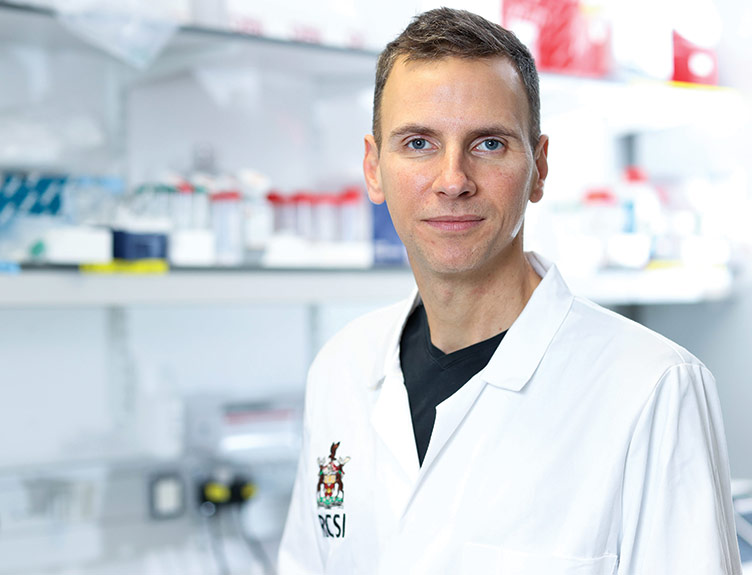Future of epilepsy research to be explored at public seminar

A public seminar which will explore cutting-edge epilepsy research entitled ‘Epilepsy Research Explained: Recent Discoveries and Future Directions’ will take place in RCSI, St Stephen's Green this evening.
The event, which is jointly hosted by Epilepsy Ireland and RCSI is aimed at a public audience and will highlight recent discoveries in epilepsy and what the future of epilepsy treatment might hold. Due to unprecedented demand, the event is fully booked.
A host of Irish epilepsy experts and researchers, including a number of RCSI researchers, who are actively engaged in national and international research efforts to uncover the mysteries of epilepsy, will speak at the event. These are Professor Norman Delanty, Consultant Neurologist and Director of the Epilepsy Programme at Beaumont Hospital and Honorary Clinical Associate Professor, RCSI; Professor David Henshall, Director of the Experimental Epilepsy Research group at RCSI; Dr Gianpiero Cavalleri, Senior Lecturer in Human Genetics, Department of Molecular and Cellular Therapeutics, RCSI; and Professor Mary King, Consultant Paediatric Neurologist, Professor Mary King.
Boosted by a growing interest in and funding for brain research in recent years, epilepsy researchers, are increasingly collaborating on large scale international projects. RCSI's Professor David Henshall co-ordinates the EU-funded EpimiRNA Consortium, which involves 16 partners from 10 countries investigating molecular mechanisms in epilepsy, while the EPIPGX consortium, which includes Dr Gianpiero Cavalleri is working internationally to identify genetic biomarkers that influence people's individual response to treatments. Both will discuss their work at tonight's event.
Dr Sinead Heavin, an Epilepsy Ireland/ Irish Research Council funded post-doctoral researcher, Department of Molecular and Cellular Therapeutics, RCSI, acted as the RCSI co-ordinator for the event.
Dr Gianpiero Cavalleri commented: "RCSI is contributing globally to epilepsy research, with a number of large scale international projects being led by the College. Tonight's event provides an important opportunity to share these research findings with members of the public and individuals with epilepsy and their families and to communicate how RCSI's research is making strides in improving treatments for the condition."
According to Epilepsy Ireland, there are 37,000 people with epilepsy in Ireland, including an estimated 12,000 to 15,000 who are having regular seizures - sudden surges of electrical activity in the brain. The condition can be the cause of significant disability, reduced quality of life and stigma. There are an estimated 130 epilepsy-related deaths each year in Ireland.
RCSI Research being presented at the event includes:
How genetics can help us better understand and treat epilepsy - Dr Gianpiero Cavalleri, RCSI:
This talk will explain some common genetic terminology and introduce the basic concepts on which genetic testing is based. It will provide an explanation of the different technologies that are now available to determine the contribution of genes to a particular individual's epilepsy. Dr Cavalleri will summarise recent progress that has been made in our understanding of how genes contribute to the development of seizures and how they can potentially guide treatment. Finally, Dr. Cavalleri will describe a new research system that is being installed at RCSI that we hope will help us better understand the genetics of epilepsy in Ireland and internationally.
Brain signals in your blood: the tiny chemicals that can tell us about your epilepsy - Professor David Henshall, RCSI:
Professor Henshall's laboratory is interested in genes which affect the brain's excitability and how changes in their levels may cause epilepsy. His presentation will focus on recent discoveries about tiny molecules called microRNA that are found in the brain and in blood. Some of these control brain excitability so their presence in blood could provide clues to a patient's epilepsy. Blood tests could be developed from this that would help doctors better predict who is at risk of epilepsy, decisions on which is the best drug for them, and help with diagnosis.
How will we be treating epilepsy in 2025? - Professor Norman Delanty, Beaumont Hospital and RCSI:
Using his experience of 20 years of treating epilepsy, Professor Delanty will discuss how epilepsy may be treated in the future. There are a variety of new and exciting approaches under development for the diagnosis, management and treatment of epilepsy, including novel genetic approaches and new drugs and devices. He will also look at the rapidly developing area of information technology, providing electronic patient records and applications to help track and describe an individual's condition. Professor Delanty will look to place these approaches in the context of epilepsy treatment in Ireland.
Epilepsy Ireland actively supports and funds epilepsy research in Ireland. Since 2009, the charity has invested almost €800,000 in eight local projects that are contributing significantly to our understanding of epilepsy and to the search for causes and better treatments.



